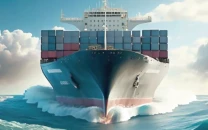Polyester raw material: Lotte Chemical seeks protection from PTA imports
Files petition with NTC for increase in customs duty from 4% to 5%.

Lotte Pakistan is a producer of purified terephthalic acid, an essential raw material used in the polyester fibre industry. PHOTO: FILE
Lotte Chemical Pakistan Limited – the sole producer of pure terephthalic acid (PTA) – has sought protection against cheaper imports of the acid that is being used by the polyester industry, fearing it may grab the company’s market share.
Lotte Chemical Pakistan, owned by South Korean conglomerate Lotte, has filed a petition with the National Tariff Commission (NTC), seeking an increase in customs duty on PTA imports from 4% to 5%, according to a press release.
If the NTC accepts the petition, it will result in at least Rs800 million additional burden on industries, particularly textile, that use PTA in manufacturing of their products, said officials in the Ministry of Commerce.
The increase in customs duty will give a reason to the textile millers to push up prices of their products manufactured by using PTA.
PTA is an essential raw material used in the polyester industry and polyester fibre is gradually replacing cotton in the world. It is also used as raw material for video and audio films, paints, industrial yarns and ET bottles.
The company has taken the plea that 4% customs duty was not providing adequate protection to its plant that has annual production capacity of 500,000 tons. The output is sufficient to meet the textile industry’s annual requirement.
However, Lotte’s plant is not as efficient as that of China due to its old technology that has increased the cost of doing business. Lotte Pakistan had yet to respond to the request for comments.
In its petition, Lotte argued that the landed cost of imported PTA had decreased during 2014, said the NTC. It said industry margins at international prices of PTA and its raw material have significantly declined due to huge oversupply of the acid in Asia.
Lotte said new production capacities installed in China, India and other countries are based on latest technologies and have much lower production costs, which have contributed to a reduction in industrial margins, which are not likely to return to previous levels anytime soon.
After securing guarantees for 10-year protection from international competition, Lotte’s PTA plant started production in 1998. Until 2008, the successive governments protected domestic manufacturing by keeping customs duty at 15%. After the end of protection, the previous government reduced the duty to 7.5%.
Following a study conducted by the NTC, the government lowered the duty to 3% on PTA and 6% on polyester staple fibre (PSF). However, after coming under pressure from investors, it increased the duty on PTA to 4%.
Officials of the commerce ministry said in its study the NTC has kept the customs duty on PTA unchanged at 4% but recommended to the government to increase the duty on PSF to 7%. However, the Federal Board of Revenue did not agree to increase the PSF duty to 7%.
It will be difficult for the NTC to accept Lotte’s request after it recommended no change in the customs duty, said the ministry officials. However, the reasons for maintaining the duty at 4% are not known, as the NTC did not share its study with all the stakeholders.
The study was done much before Lotte submitted its application for protection, the officials said.
Lotte Pakistan has pleaded that the conversion cost of PTA has increased due to rise in the energy cost of its plant.
After the company’s application, the NTC has initiated an inquiry. It has invited proposals from all parties having interest in the business, related to or associated with exports, manufacturing, marketing and use of PTA.
Published in The Express Tribune, June 16th, 2015.
Like Business on Facebook, follow @TribuneBiz on Twitter to stay informed and join in the conversation.



















COMMENTS
Comments are moderated and generally will be posted if they are on-topic and not abusive.
For more information, please see our Comments FAQ